Analysis of Trauma Informed Care Process: Mark's Case Study Report
VerifiedAdded on 2023/01/19
|10
|3080
|24
Report
AI Summary
This report presents a detailed analysis of Mark's case study, exploring the application of the Trauma Informed Care Process (TICP) in addressing mental health challenges and substance use. The student identifies three key issues contributing to Mark's difficulties: lack of awareness of his mental illness, excessive substance abuse, and the absence of peer and colleague support. The report supports these issues with current literature and discusses them through the lens of TICP principles, including empowerment, safety and security, awareness, and support. It highlights the importance of collaborative care involving mental health professionals, therapists, peers, and family. The report emphasizes the significance of applying TICP principles to promote patient integrity, self-awareness, confidence, and goal setting to overcome mental health conditions. The conclusion underscores the potential for improved outcomes with early awareness, access to support, and the application of TICP principles.
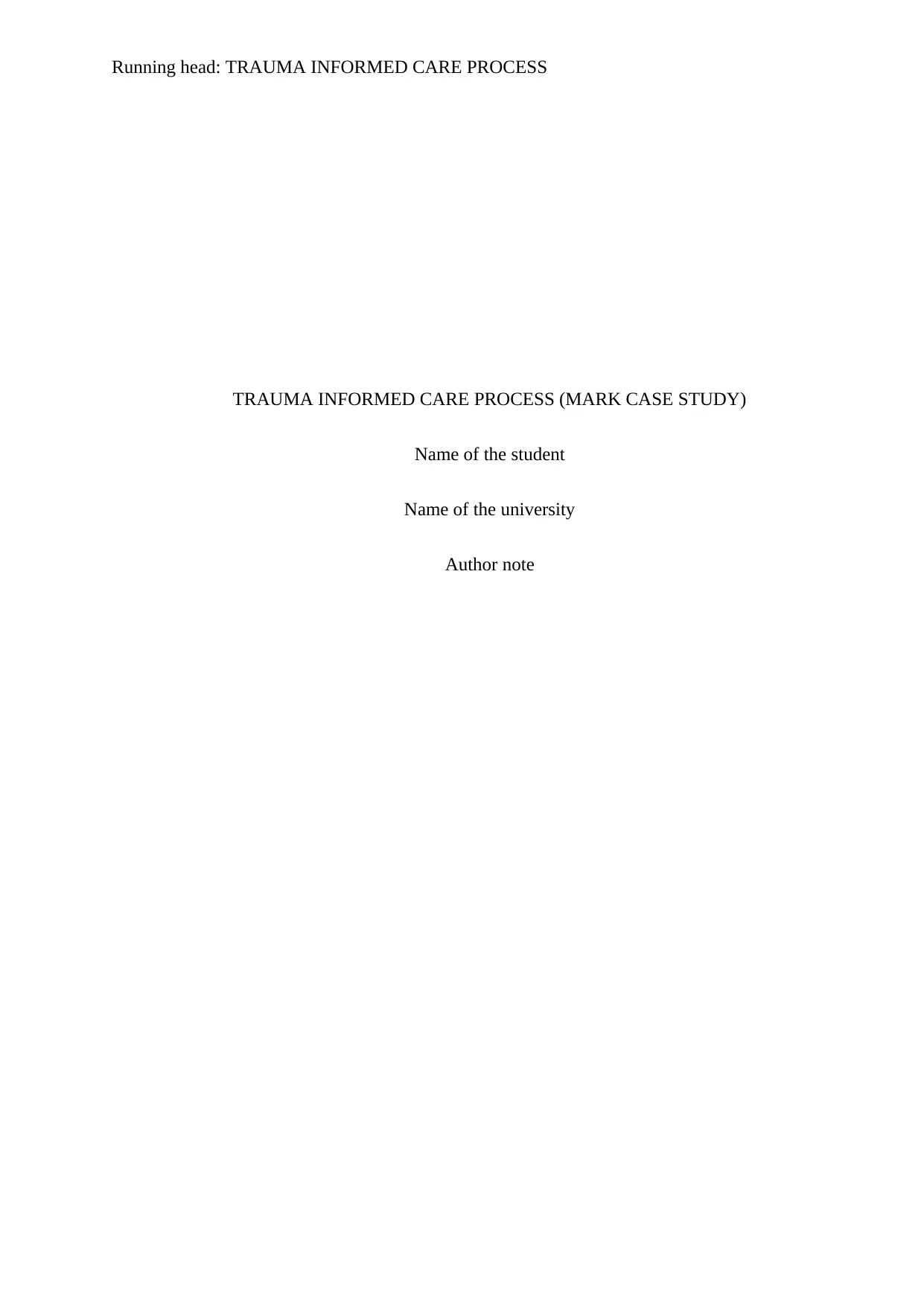
Running head: TRAUMA INFORMED CARE PROCESS
TRAUMA INFORMED CARE PROCESS (MARK CASE STUDY)
Name of the student
Name of the university
Author note
TRAUMA INFORMED CARE PROCESS (MARK CASE STUDY)
Name of the student
Name of the university
Author note
Paraphrase This Document
Need a fresh take? Get an instant paraphrase of this document with our AI Paraphraser
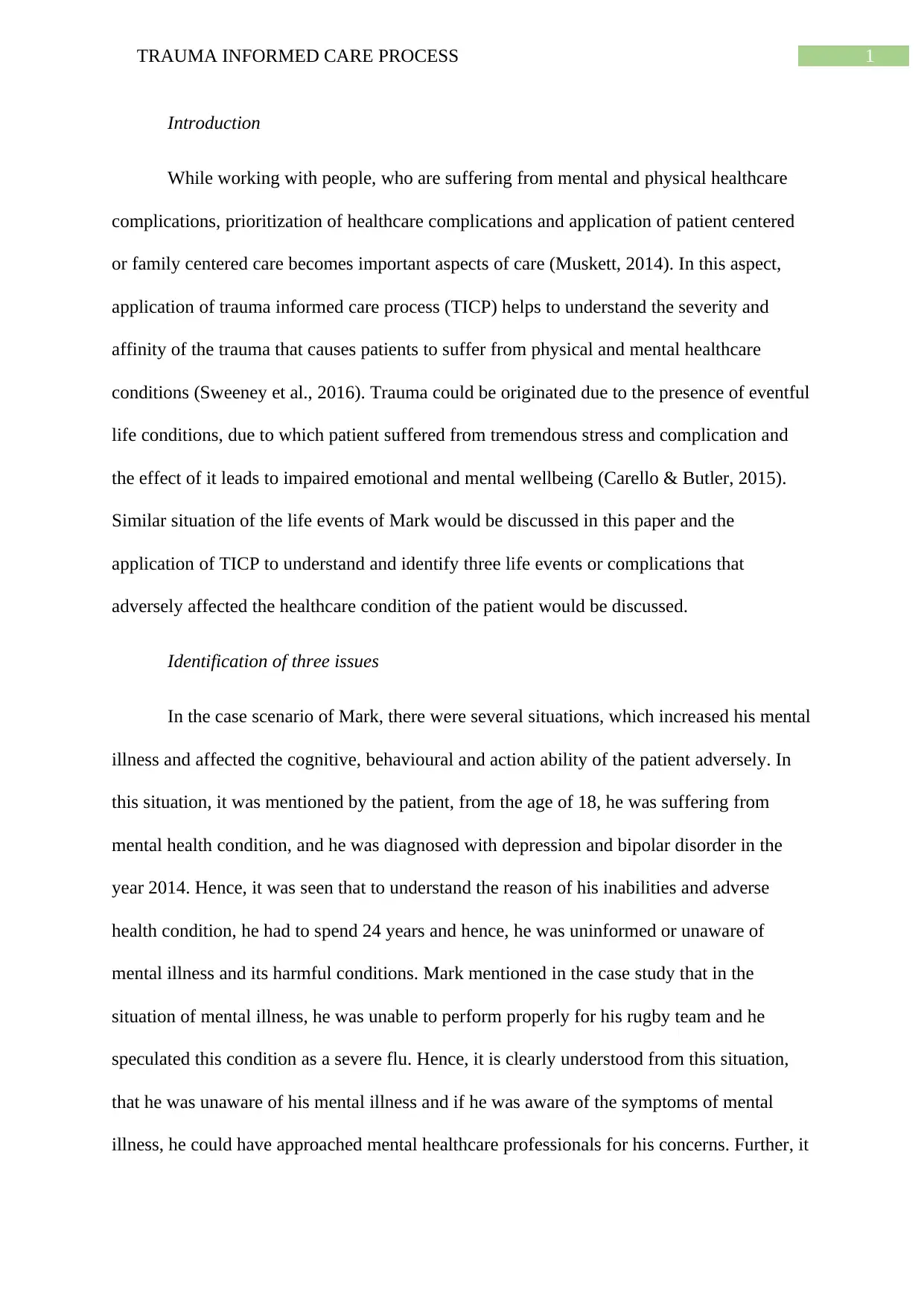
1TRAUMA INFORMED CARE PROCESS
Introduction
While working with people, who are suffering from mental and physical healthcare
complications, prioritization of healthcare complications and application of patient centered
or family centered care becomes important aspects of care (Muskett, 2014). In this aspect,
application of trauma informed care process (TICP) helps to understand the severity and
affinity of the trauma that causes patients to suffer from physical and mental healthcare
conditions (Sweeney et al., 2016). Trauma could be originated due to the presence of eventful
life conditions, due to which patient suffered from tremendous stress and complication and
the effect of it leads to impaired emotional and mental wellbeing (Carello & Butler, 2015).
Similar situation of the life events of Mark would be discussed in this paper and the
application of TICP to understand and identify three life events or complications that
adversely affected the healthcare condition of the patient would be discussed.
Identification of three issues
In the case scenario of Mark, there were several situations, which increased his mental
illness and affected the cognitive, behavioural and action ability of the patient adversely. In
this situation, it was mentioned by the patient, from the age of 18, he was suffering from
mental health condition, and he was diagnosed with depression and bipolar disorder in the
year 2014. Hence, it was seen that to understand the reason of his inabilities and adverse
health condition, he had to spend 24 years and hence, he was uninformed or unaware of
mental illness and its harmful conditions. Mark mentioned in the case study that in the
situation of mental illness, he was unable to perform properly for his rugby team and he
speculated this condition as a severe flu. Hence, it is clearly understood from this situation,
that he was unaware of his mental illness and if he was aware of the symptoms of mental
illness, he could have approached mental healthcare professionals for his concerns. Further, it
Introduction
While working with people, who are suffering from mental and physical healthcare
complications, prioritization of healthcare complications and application of patient centered
or family centered care becomes important aspects of care (Muskett, 2014). In this aspect,
application of trauma informed care process (TICP) helps to understand the severity and
affinity of the trauma that causes patients to suffer from physical and mental healthcare
conditions (Sweeney et al., 2016). Trauma could be originated due to the presence of eventful
life conditions, due to which patient suffered from tremendous stress and complication and
the effect of it leads to impaired emotional and mental wellbeing (Carello & Butler, 2015).
Similar situation of the life events of Mark would be discussed in this paper and the
application of TICP to understand and identify three life events or complications that
adversely affected the healthcare condition of the patient would be discussed.
Identification of three issues
In the case scenario of Mark, there were several situations, which increased his mental
illness and affected the cognitive, behavioural and action ability of the patient adversely. In
this situation, it was mentioned by the patient, from the age of 18, he was suffering from
mental health condition, and he was diagnosed with depression and bipolar disorder in the
year 2014. Hence, it was seen that to understand the reason of his inabilities and adverse
health condition, he had to spend 24 years and hence, he was uninformed or unaware of
mental illness and its harmful conditions. Mark mentioned in the case study that in the
situation of mental illness, he was unable to perform properly for his rugby team and he
speculated this condition as a severe flu. Hence, it is clearly understood from this situation,
that he was unaware of his mental illness and if he was aware of the symptoms of mental
illness, he could have approached mental healthcare professionals for his concerns. Further, it
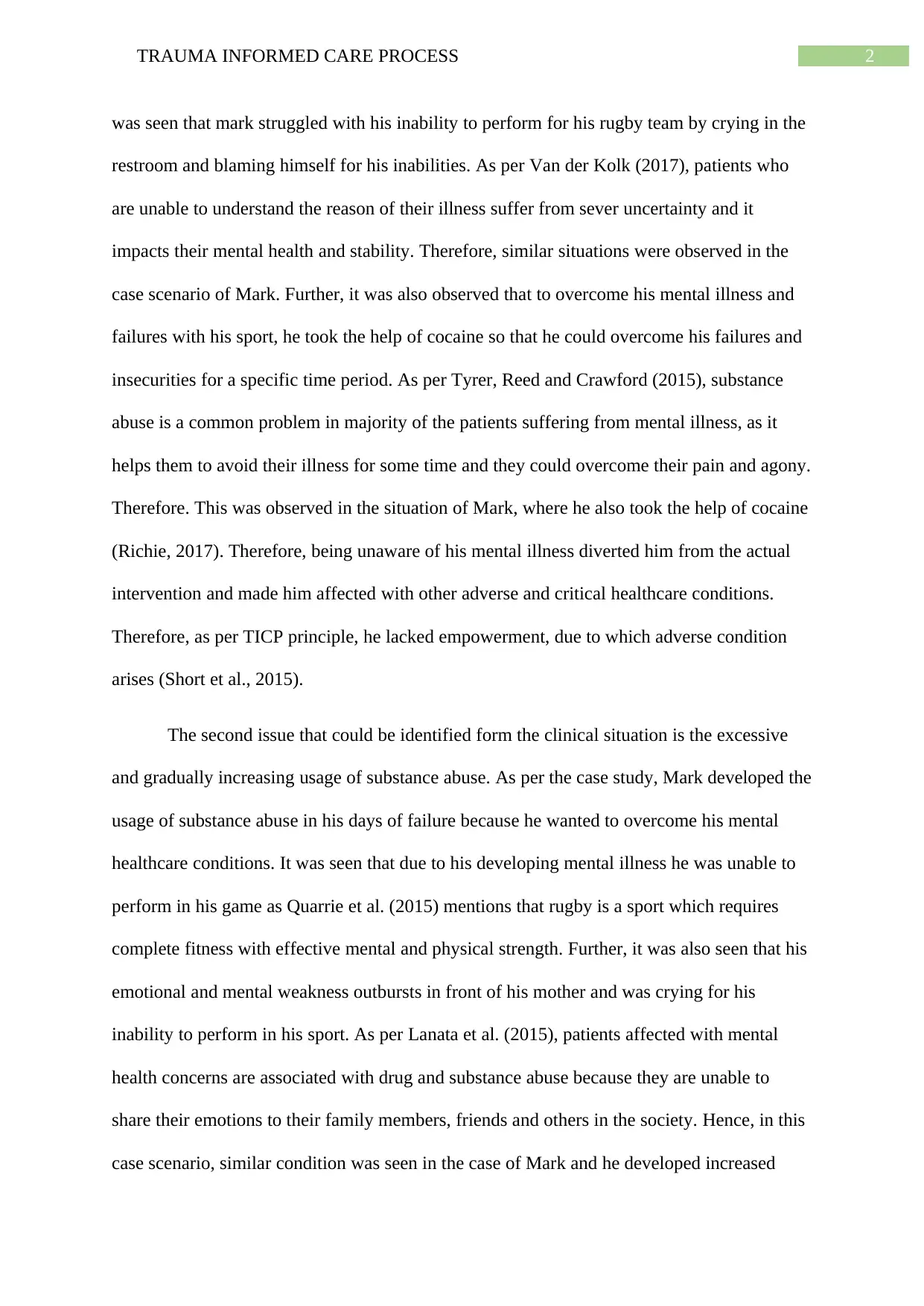
2TRAUMA INFORMED CARE PROCESS
was seen that mark struggled with his inability to perform for his rugby team by crying in the
restroom and blaming himself for his inabilities. As per Van der Kolk (2017), patients who
are unable to understand the reason of their illness suffer from sever uncertainty and it
impacts their mental health and stability. Therefore, similar situations were observed in the
case scenario of Mark. Further, it was also observed that to overcome his mental illness and
failures with his sport, he took the help of cocaine so that he could overcome his failures and
insecurities for a specific time period. As per Tyrer, Reed and Crawford (2015), substance
abuse is a common problem in majority of the patients suffering from mental illness, as it
helps them to avoid their illness for some time and they could overcome their pain and agony.
Therefore. This was observed in the situation of Mark, where he also took the help of cocaine
(Richie, 2017). Therefore, being unaware of his mental illness diverted him from the actual
intervention and made him affected with other adverse and critical healthcare conditions.
Therefore, as per TICP principle, he lacked empowerment, due to which adverse condition
arises (Short et al., 2015).
The second issue that could be identified form the clinical situation is the excessive
and gradually increasing usage of substance abuse. As per the case study, Mark developed the
usage of substance abuse in his days of failure because he wanted to overcome his mental
healthcare conditions. It was seen that due to his developing mental illness he was unable to
perform in his game as Quarrie et al. (2015) mentions that rugby is a sport which requires
complete fitness with effective mental and physical strength. Further, it was also seen that his
emotional and mental weakness outbursts in front of his mother and was crying for his
inability to perform in his sport. As per Lanata et al. (2015), patients affected with mental
health concerns are associated with drug and substance abuse because they are unable to
share their emotions to their family members, friends and others in the society. Hence, in this
case scenario, similar condition was seen in the case of Mark and he developed increased
was seen that mark struggled with his inability to perform for his rugby team by crying in the
restroom and blaming himself for his inabilities. As per Van der Kolk (2017), patients who
are unable to understand the reason of their illness suffer from sever uncertainty and it
impacts their mental health and stability. Therefore, similar situations were observed in the
case scenario of Mark. Further, it was also observed that to overcome his mental illness and
failures with his sport, he took the help of cocaine so that he could overcome his failures and
insecurities for a specific time period. As per Tyrer, Reed and Crawford (2015), substance
abuse is a common problem in majority of the patients suffering from mental illness, as it
helps them to avoid their illness for some time and they could overcome their pain and agony.
Therefore. This was observed in the situation of Mark, where he also took the help of cocaine
(Richie, 2017). Therefore, being unaware of his mental illness diverted him from the actual
intervention and made him affected with other adverse and critical healthcare conditions.
Therefore, as per TICP principle, he lacked empowerment, due to which adverse condition
arises (Short et al., 2015).
The second issue that could be identified form the clinical situation is the excessive
and gradually increasing usage of substance abuse. As per the case study, Mark developed the
usage of substance abuse in his days of failure because he wanted to overcome his mental
healthcare conditions. It was seen that due to his developing mental illness he was unable to
perform in his game as Quarrie et al. (2015) mentions that rugby is a sport which requires
complete fitness with effective mental and physical strength. Further, it was also seen that his
emotional and mental weakness outbursts in front of his mother and was crying for his
inability to perform in his sport. As per Lanata et al. (2015), patients affected with mental
health concerns are associated with drug and substance abuse because they are unable to
share their emotions to their family members, friends and others in the society. Hence, in this
case scenario, similar condition was seen in the case of Mark and he developed increased
⊘ This is a preview!⊘
Do you want full access?
Subscribe today to unlock all pages.

Trusted by 1+ million students worldwide
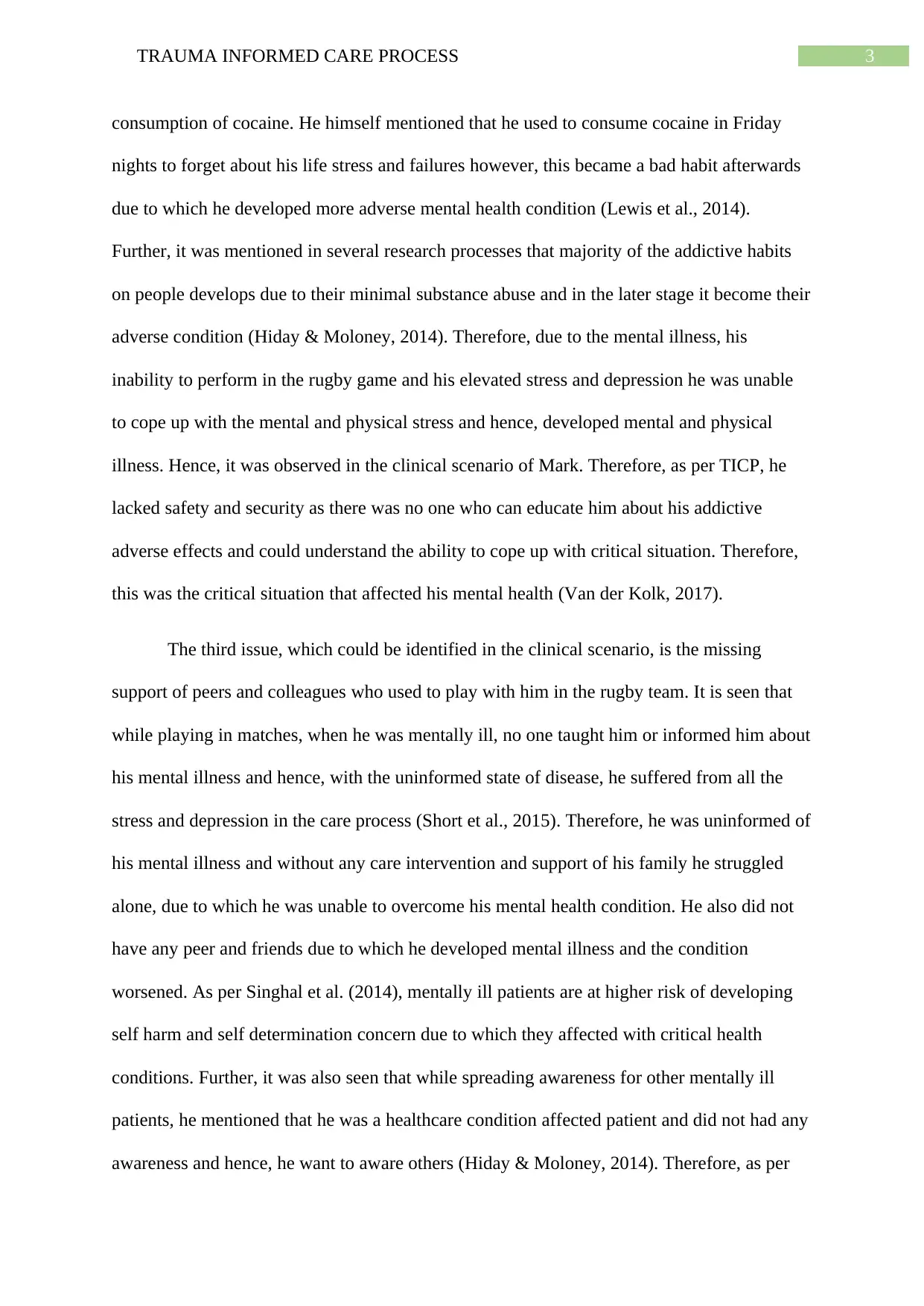
3TRAUMA INFORMED CARE PROCESS
consumption of cocaine. He himself mentioned that he used to consume cocaine in Friday
nights to forget about his life stress and failures however, this became a bad habit afterwards
due to which he developed more adverse mental health condition (Lewis et al., 2014).
Further, it was mentioned in several research processes that majority of the addictive habits
on people develops due to their minimal substance abuse and in the later stage it become their
adverse condition (Hiday & Moloney, 2014). Therefore, due to the mental illness, his
inability to perform in the rugby game and his elevated stress and depression he was unable
to cope up with the mental and physical stress and hence, developed mental and physical
illness. Hence, it was observed in the clinical scenario of Mark. Therefore, as per TICP, he
lacked safety and security as there was no one who can educate him about his addictive
adverse effects and could understand the ability to cope up with critical situation. Therefore,
this was the critical situation that affected his mental health (Van der Kolk, 2017).
The third issue, which could be identified in the clinical scenario, is the missing
support of peers and colleagues who used to play with him in the rugby team. It is seen that
while playing in matches, when he was mentally ill, no one taught him or informed him about
his mental illness and hence, with the uninformed state of disease, he suffered from all the
stress and depression in the care process (Short et al., 2015). Therefore, he was uninformed of
his mental illness and without any care intervention and support of his family he struggled
alone, due to which he was unable to overcome his mental health condition. He also did not
have any peer and friends due to which he developed mental illness and the condition
worsened. As per Singhal et al. (2014), mentally ill patients are at higher risk of developing
self harm and self determination concern due to which they affected with critical health
conditions. Further, it was also seen that while spreading awareness for other mentally ill
patients, he mentioned that he was a healthcare condition affected patient and did not had any
awareness and hence, he want to aware others (Hiday & Moloney, 2014). Therefore, as per
consumption of cocaine. He himself mentioned that he used to consume cocaine in Friday
nights to forget about his life stress and failures however, this became a bad habit afterwards
due to which he developed more adverse mental health condition (Lewis et al., 2014).
Further, it was mentioned in several research processes that majority of the addictive habits
on people develops due to their minimal substance abuse and in the later stage it become their
adverse condition (Hiday & Moloney, 2014). Therefore, due to the mental illness, his
inability to perform in the rugby game and his elevated stress and depression he was unable
to cope up with the mental and physical stress and hence, developed mental and physical
illness. Hence, it was observed in the clinical scenario of Mark. Therefore, as per TICP, he
lacked safety and security as there was no one who can educate him about his addictive
adverse effects and could understand the ability to cope up with critical situation. Therefore,
this was the critical situation that affected his mental health (Van der Kolk, 2017).
The third issue, which could be identified in the clinical scenario, is the missing
support of peers and colleagues who used to play with him in the rugby team. It is seen that
while playing in matches, when he was mentally ill, no one taught him or informed him about
his mental illness and hence, with the uninformed state of disease, he suffered from all the
stress and depression in the care process (Short et al., 2015). Therefore, he was uninformed of
his mental illness and without any care intervention and support of his family he struggled
alone, due to which he was unable to overcome his mental health condition. He also did not
have any peer and friends due to which he developed mental illness and the condition
worsened. As per Singhal et al. (2014), mentally ill patients are at higher risk of developing
self harm and self determination concern due to which they affected with critical health
conditions. Further, it was also seen that while spreading awareness for other mentally ill
patients, he mentioned that he was a healthcare condition affected patient and did not had any
awareness and hence, he want to aware others (Hiday & Moloney, 2014). Therefore, as per
Paraphrase This Document
Need a fresh take? Get an instant paraphrase of this document with our AI Paraphraser
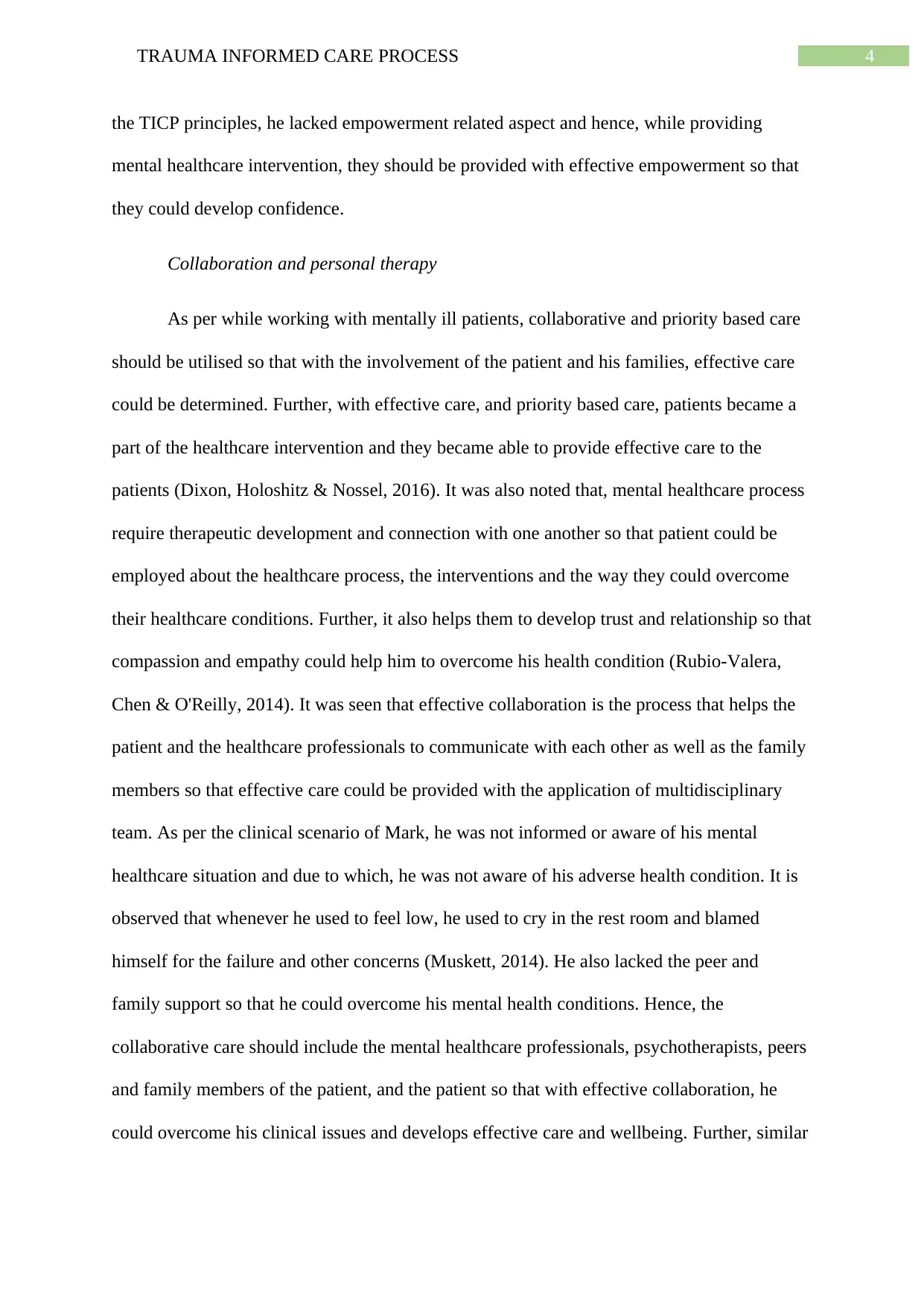
4TRAUMA INFORMED CARE PROCESS
the TICP principles, he lacked empowerment related aspect and hence, while providing
mental healthcare intervention, they should be provided with effective empowerment so that
they could develop confidence.
Collaboration and personal therapy
As per while working with mentally ill patients, collaborative and priority based care
should be utilised so that with the involvement of the patient and his families, effective care
could be determined. Further, with effective care, and priority based care, patients became a
part of the healthcare intervention and they became able to provide effective care to the
patients (Dixon, Holoshitz & Nossel, 2016). It was also noted that, mental healthcare process
require therapeutic development and connection with one another so that patient could be
employed about the healthcare process, the interventions and the way they could overcome
their healthcare conditions. Further, it also helps them to develop trust and relationship so that
compassion and empathy could help him to overcome his health condition (Rubio-Valera,
Chen & O'Reilly, 2014). It was seen that effective collaboration is the process that helps the
patient and the healthcare professionals to communicate with each other as well as the family
members so that effective care could be provided with the application of multidisciplinary
team. As per the clinical scenario of Mark, he was not informed or aware of his mental
healthcare situation and due to which, he was not aware of his adverse health condition. It is
observed that whenever he used to feel low, he used to cry in the rest room and blamed
himself for the failure and other concerns (Muskett, 2014). He also lacked the peer and
family support so that he could overcome his mental health conditions. Hence, the
collaborative care should include the mental healthcare professionals, psychotherapists, peers
and family members of the patient, and the patient so that with effective collaboration, he
could overcome his clinical issues and develops effective care and wellbeing. Further, similar
the TICP principles, he lacked empowerment related aspect and hence, while providing
mental healthcare intervention, they should be provided with effective empowerment so that
they could develop confidence.
Collaboration and personal therapy
As per while working with mentally ill patients, collaborative and priority based care
should be utilised so that with the involvement of the patient and his families, effective care
could be determined. Further, with effective care, and priority based care, patients became a
part of the healthcare intervention and they became able to provide effective care to the
patients (Dixon, Holoshitz & Nossel, 2016). It was also noted that, mental healthcare process
require therapeutic development and connection with one another so that patient could be
employed about the healthcare process, the interventions and the way they could overcome
their healthcare conditions. Further, it also helps them to develop trust and relationship so that
compassion and empathy could help him to overcome his health condition (Rubio-Valera,
Chen & O'Reilly, 2014). It was seen that effective collaboration is the process that helps the
patient and the healthcare professionals to communicate with each other as well as the family
members so that effective care could be provided with the application of multidisciplinary
team. As per the clinical scenario of Mark, he was not informed or aware of his mental
healthcare situation and due to which, he was not aware of his adverse health condition. It is
observed that whenever he used to feel low, he used to cry in the rest room and blamed
himself for the failure and other concerns (Muskett, 2014). He also lacked the peer and
family support so that he could overcome his mental health conditions. Hence, the
collaborative care should include the mental healthcare professionals, psychotherapists, peers
and family members of the patient, and the patient so that with effective collaboration, he
could overcome his clinical issues and develops effective care and wellbeing. Further, similar
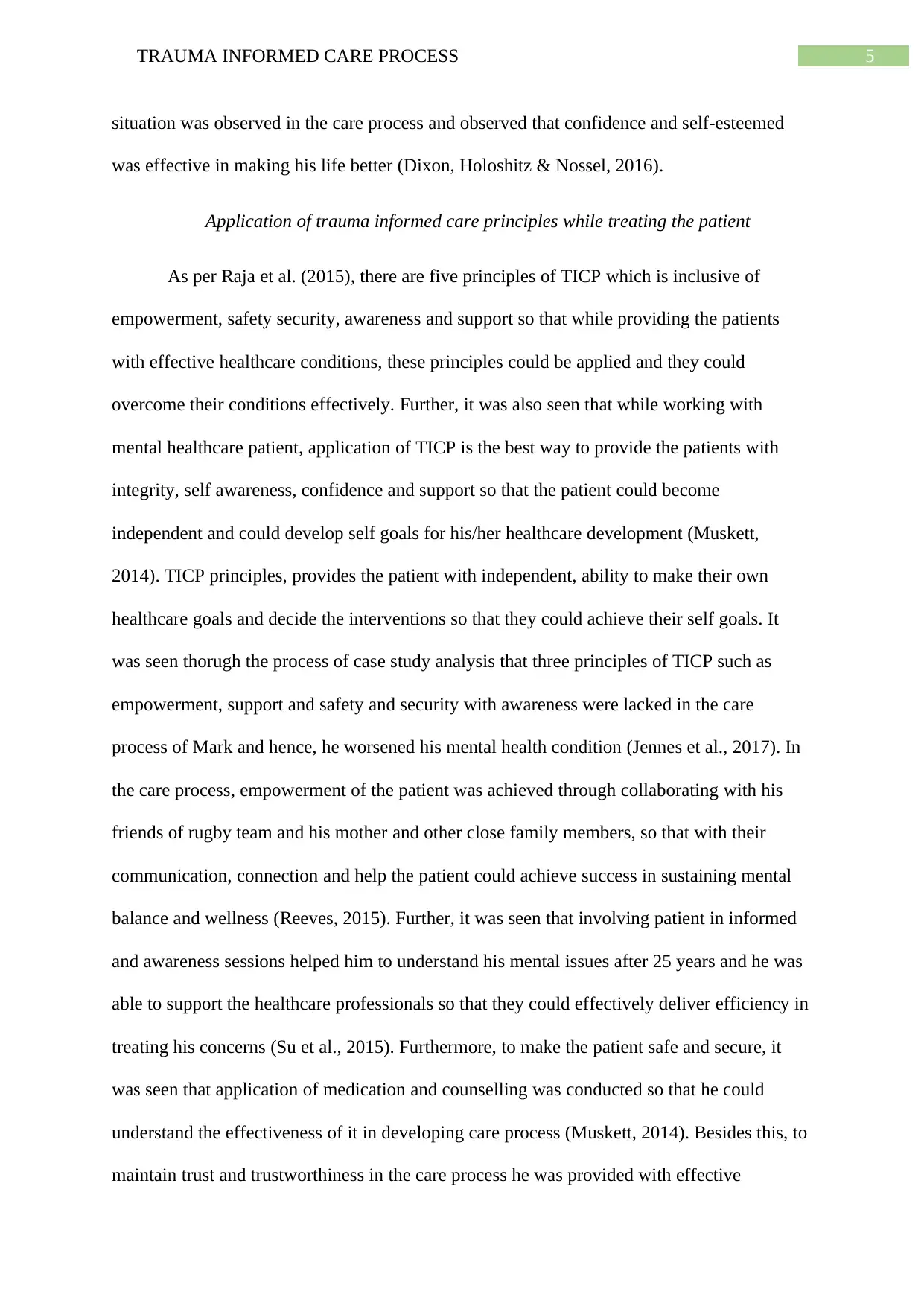
5TRAUMA INFORMED CARE PROCESS
situation was observed in the care process and observed that confidence and self-esteemed
was effective in making his life better (Dixon, Holoshitz & Nossel, 2016).
Application of trauma informed care principles while treating the patient
As per Raja et al. (2015), there are five principles of TICP which is inclusive of
empowerment, safety security, awareness and support so that while providing the patients
with effective healthcare conditions, these principles could be applied and they could
overcome their conditions effectively. Further, it was also seen that while working with
mental healthcare patient, application of TICP is the best way to provide the patients with
integrity, self awareness, confidence and support so that the patient could become
independent and could develop self goals for his/her healthcare development (Muskett,
2014). TICP principles, provides the patient with independent, ability to make their own
healthcare goals and decide the interventions so that they could achieve their self goals. It
was seen thorugh the process of case study analysis that three principles of TICP such as
empowerment, support and safety and security with awareness were lacked in the care
process of Mark and hence, he worsened his mental health condition (Jennes et al., 2017). In
the care process, empowerment of the patient was achieved through collaborating with his
friends of rugby team and his mother and other close family members, so that with their
communication, connection and help the patient could achieve success in sustaining mental
balance and wellness (Reeves, 2015). Further, it was seen that involving patient in informed
and awareness sessions helped him to understand his mental issues after 25 years and he was
able to support the healthcare professionals so that they could effectively deliver efficiency in
treating his concerns (Su et al., 2015). Furthermore, to make the patient safe and secure, it
was seen that application of medication and counselling was conducted so that he could
understand the effectiveness of it in developing care process (Muskett, 2014). Besides this, to
maintain trust and trustworthiness in the care process he was provided with effective
situation was observed in the care process and observed that confidence and self-esteemed
was effective in making his life better (Dixon, Holoshitz & Nossel, 2016).
Application of trauma informed care principles while treating the patient
As per Raja et al. (2015), there are five principles of TICP which is inclusive of
empowerment, safety security, awareness and support so that while providing the patients
with effective healthcare conditions, these principles could be applied and they could
overcome their conditions effectively. Further, it was also seen that while working with
mental healthcare patient, application of TICP is the best way to provide the patients with
integrity, self awareness, confidence and support so that the patient could become
independent and could develop self goals for his/her healthcare development (Muskett,
2014). TICP principles, provides the patient with independent, ability to make their own
healthcare goals and decide the interventions so that they could achieve their self goals. It
was seen thorugh the process of case study analysis that three principles of TICP such as
empowerment, support and safety and security with awareness were lacked in the care
process of Mark and hence, he worsened his mental health condition (Jennes et al., 2017). In
the care process, empowerment of the patient was achieved through collaborating with his
friends of rugby team and his mother and other close family members, so that with their
communication, connection and help the patient could achieve success in sustaining mental
balance and wellness (Reeves, 2015). Further, it was seen that involving patient in informed
and awareness sessions helped him to understand his mental issues after 25 years and he was
able to support the healthcare professionals so that they could effectively deliver efficiency in
treating his concerns (Su et al., 2015). Furthermore, to make the patient safe and secure, it
was seen that application of medication and counselling was conducted so that he could
understand the effectiveness of it in developing care process (Muskett, 2014). Besides this, to
maintain trust and trustworthiness in the care process he was provided with effective
⊘ This is a preview!⊘
Do you want full access?
Subscribe today to unlock all pages.

Trusted by 1+ million students worldwide
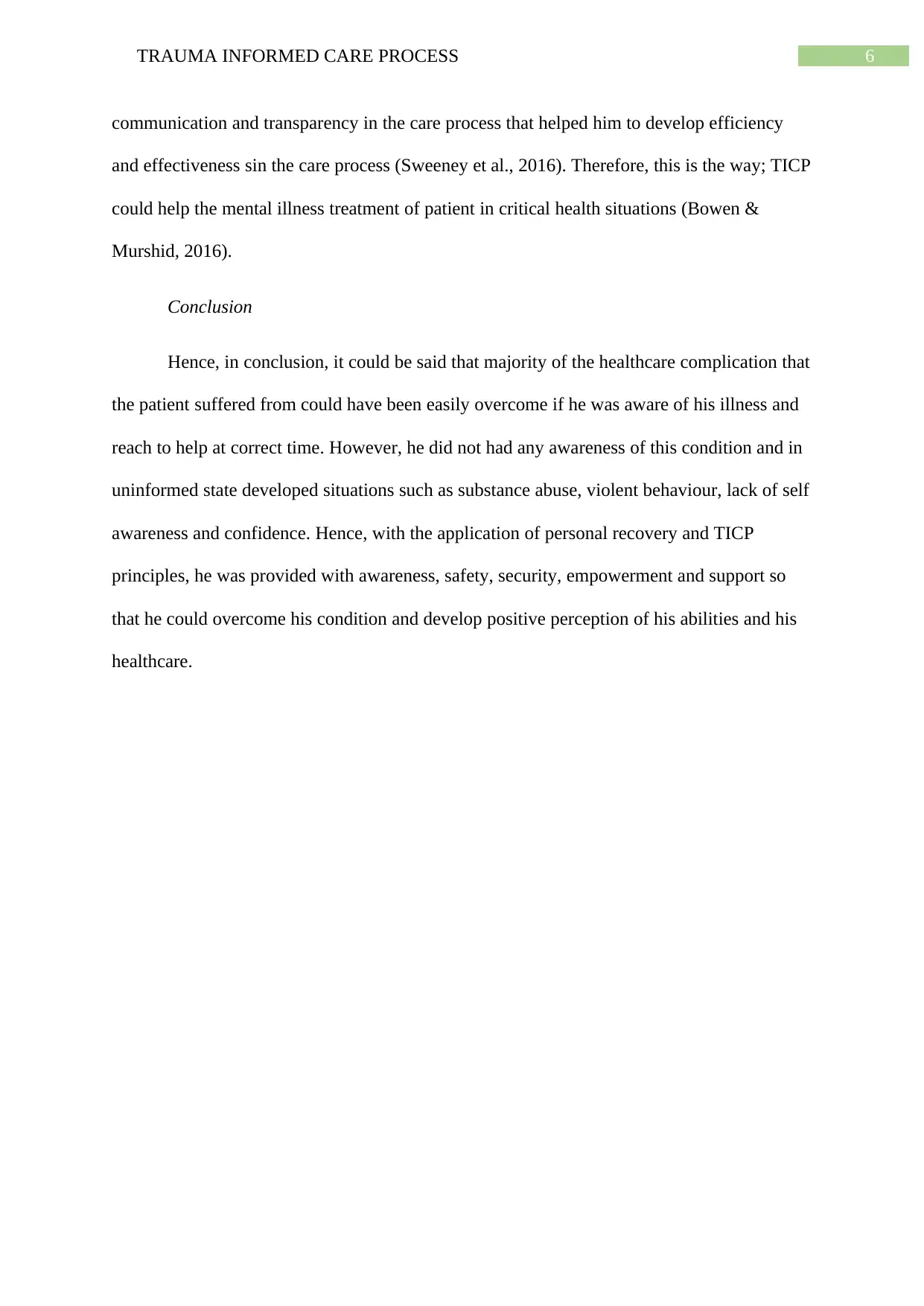
6TRAUMA INFORMED CARE PROCESS
communication and transparency in the care process that helped him to develop efficiency
and effectiveness sin the care process (Sweeney et al., 2016). Therefore, this is the way; TICP
could help the mental illness treatment of patient in critical health situations (Bowen &
Murshid, 2016).
Conclusion
Hence, in conclusion, it could be said that majority of the healthcare complication that
the patient suffered from could have been easily overcome if he was aware of his illness and
reach to help at correct time. However, he did not had any awareness of this condition and in
uninformed state developed situations such as substance abuse, violent behaviour, lack of self
awareness and confidence. Hence, with the application of personal recovery and TICP
principles, he was provided with awareness, safety, security, empowerment and support so
that he could overcome his condition and develop positive perception of his abilities and his
healthcare.
communication and transparency in the care process that helped him to develop efficiency
and effectiveness sin the care process (Sweeney et al., 2016). Therefore, this is the way; TICP
could help the mental illness treatment of patient in critical health situations (Bowen &
Murshid, 2016).
Conclusion
Hence, in conclusion, it could be said that majority of the healthcare complication that
the patient suffered from could have been easily overcome if he was aware of his illness and
reach to help at correct time. However, he did not had any awareness of this condition and in
uninformed state developed situations such as substance abuse, violent behaviour, lack of self
awareness and confidence. Hence, with the application of personal recovery and TICP
principles, he was provided with awareness, safety, security, empowerment and support so
that he could overcome his condition and develop positive perception of his abilities and his
healthcare.
Paraphrase This Document
Need a fresh take? Get an instant paraphrase of this document with our AI Paraphraser
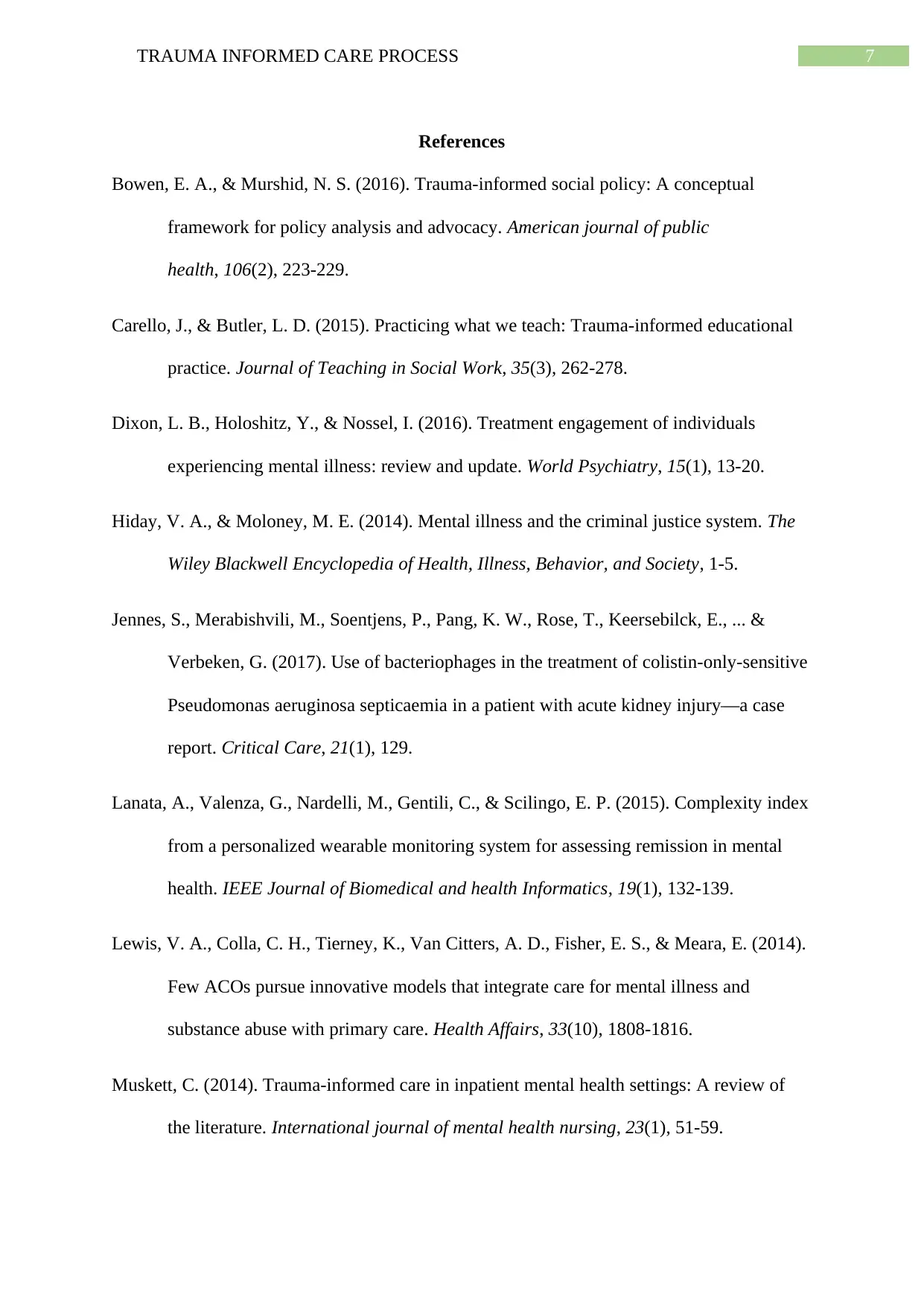
7TRAUMA INFORMED CARE PROCESS
References
Bowen, E. A., & Murshid, N. S. (2016). Trauma-informed social policy: A conceptual
framework for policy analysis and advocacy. American journal of public
health, 106(2), 223-229.
Carello, J., & Butler, L. D. (2015). Practicing what we teach: Trauma-informed educational
practice. Journal of Teaching in Social Work, 35(3), 262-278.
Dixon, L. B., Holoshitz, Y., & Nossel, I. (2016). Treatment engagement of individuals
experiencing mental illness: review and update. World Psychiatry, 15(1), 13-20.
Hiday, V. A., & Moloney, M. E. (2014). Mental illness and the criminal justice system. The
Wiley Blackwell Encyclopedia of Health, Illness, Behavior, and Society, 1-5.
Jennes, S., Merabishvili, M., Soentjens, P., Pang, K. W., Rose, T., Keersebilck, E., ... &
Verbeken, G. (2017). Use of bacteriophages in the treatment of colistin-only-sensitive
Pseudomonas aeruginosa septicaemia in a patient with acute kidney injury—a case
report. Critical Care, 21(1), 129.
Lanata, A., Valenza, G., Nardelli, M., Gentili, C., & Scilingo, E. P. (2015). Complexity index
from a personalized wearable monitoring system for assessing remission in mental
health. IEEE Journal of Biomedical and health Informatics, 19(1), 132-139.
Lewis, V. A., Colla, C. H., Tierney, K., Van Citters, A. D., Fisher, E. S., & Meara, E. (2014).
Few ACOs pursue innovative models that integrate care for mental illness and
substance abuse with primary care. Health Affairs, 33(10), 1808-1816.
Muskett, C. (2014). Trauma‐informed care in inpatient mental health settings: A review of
the literature. International journal of mental health nursing, 23(1), 51-59.
References
Bowen, E. A., & Murshid, N. S. (2016). Trauma-informed social policy: A conceptual
framework for policy analysis and advocacy. American journal of public
health, 106(2), 223-229.
Carello, J., & Butler, L. D. (2015). Practicing what we teach: Trauma-informed educational
practice. Journal of Teaching in Social Work, 35(3), 262-278.
Dixon, L. B., Holoshitz, Y., & Nossel, I. (2016). Treatment engagement of individuals
experiencing mental illness: review and update. World Psychiatry, 15(1), 13-20.
Hiday, V. A., & Moloney, M. E. (2014). Mental illness and the criminal justice system. The
Wiley Blackwell Encyclopedia of Health, Illness, Behavior, and Society, 1-5.
Jennes, S., Merabishvili, M., Soentjens, P., Pang, K. W., Rose, T., Keersebilck, E., ... &
Verbeken, G. (2017). Use of bacteriophages in the treatment of colistin-only-sensitive
Pseudomonas aeruginosa septicaemia in a patient with acute kidney injury—a case
report. Critical Care, 21(1), 129.
Lanata, A., Valenza, G., Nardelli, M., Gentili, C., & Scilingo, E. P. (2015). Complexity index
from a personalized wearable monitoring system for assessing remission in mental
health. IEEE Journal of Biomedical and health Informatics, 19(1), 132-139.
Lewis, V. A., Colla, C. H., Tierney, K., Van Citters, A. D., Fisher, E. S., & Meara, E. (2014).
Few ACOs pursue innovative models that integrate care for mental illness and
substance abuse with primary care. Health Affairs, 33(10), 1808-1816.
Muskett, C. (2014). Trauma‐informed care in inpatient mental health settings: A review of
the literature. International journal of mental health nursing, 23(1), 51-59.
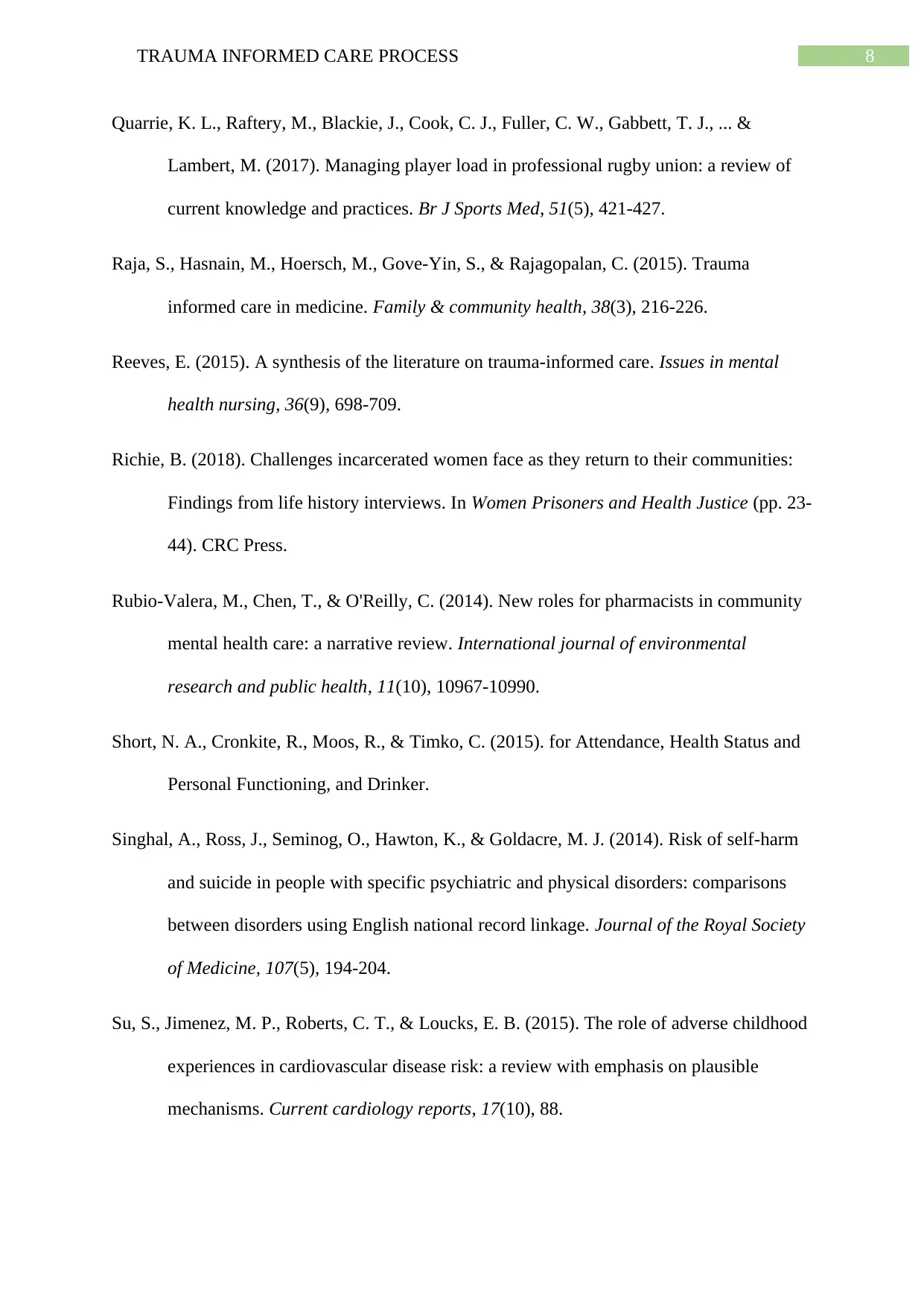
8TRAUMA INFORMED CARE PROCESS
Quarrie, K. L., Raftery, M., Blackie, J., Cook, C. J., Fuller, C. W., Gabbett, T. J., ... &
Lambert, M. (2017). Managing player load in professional rugby union: a review of
current knowledge and practices. Br J Sports Med, 51(5), 421-427.
Raja, S., Hasnain, M., Hoersch, M., Gove-Yin, S., & Rajagopalan, C. (2015). Trauma
informed care in medicine. Family & community health, 38(3), 216-226.
Reeves, E. (2015). A synthesis of the literature on trauma-informed care. Issues in mental
health nursing, 36(9), 698-709.
Richie, B. (2018). Challenges incarcerated women face as they return to their communities:
Findings from life history interviews. In Women Prisoners and Health Justice (pp. 23-
44). CRC Press.
Rubio-Valera, M., Chen, T., & O'Reilly, C. (2014). New roles for pharmacists in community
mental health care: a narrative review. International journal of environmental
research and public health, 11(10), 10967-10990.
Short, N. A., Cronkite, R., Moos, R., & Timko, C. (2015). for Attendance, Health Status and
Personal Functioning, and Drinker.
Singhal, A., Ross, J., Seminog, O., Hawton, K., & Goldacre, M. J. (2014). Risk of self-harm
and suicide in people with specific psychiatric and physical disorders: comparisons
between disorders using English national record linkage. Journal of the Royal Society
of Medicine, 107(5), 194-204.
Su, S., Jimenez, M. P., Roberts, C. T., & Loucks, E. B. (2015). The role of adverse childhood
experiences in cardiovascular disease risk: a review with emphasis on plausible
mechanisms. Current cardiology reports, 17(10), 88.
Quarrie, K. L., Raftery, M., Blackie, J., Cook, C. J., Fuller, C. W., Gabbett, T. J., ... &
Lambert, M. (2017). Managing player load in professional rugby union: a review of
current knowledge and practices. Br J Sports Med, 51(5), 421-427.
Raja, S., Hasnain, M., Hoersch, M., Gove-Yin, S., & Rajagopalan, C. (2015). Trauma
informed care in medicine. Family & community health, 38(3), 216-226.
Reeves, E. (2015). A synthesis of the literature on trauma-informed care. Issues in mental
health nursing, 36(9), 698-709.
Richie, B. (2018). Challenges incarcerated women face as they return to their communities:
Findings from life history interviews. In Women Prisoners and Health Justice (pp. 23-
44). CRC Press.
Rubio-Valera, M., Chen, T., & O'Reilly, C. (2014). New roles for pharmacists in community
mental health care: a narrative review. International journal of environmental
research and public health, 11(10), 10967-10990.
Short, N. A., Cronkite, R., Moos, R., & Timko, C. (2015). for Attendance, Health Status and
Personal Functioning, and Drinker.
Singhal, A., Ross, J., Seminog, O., Hawton, K., & Goldacre, M. J. (2014). Risk of self-harm
and suicide in people with specific psychiatric and physical disorders: comparisons
between disorders using English national record linkage. Journal of the Royal Society
of Medicine, 107(5), 194-204.
Su, S., Jimenez, M. P., Roberts, C. T., & Loucks, E. B. (2015). The role of adverse childhood
experiences in cardiovascular disease risk: a review with emphasis on plausible
mechanisms. Current cardiology reports, 17(10), 88.
⊘ This is a preview!⊘
Do you want full access?
Subscribe today to unlock all pages.

Trusted by 1+ million students worldwide
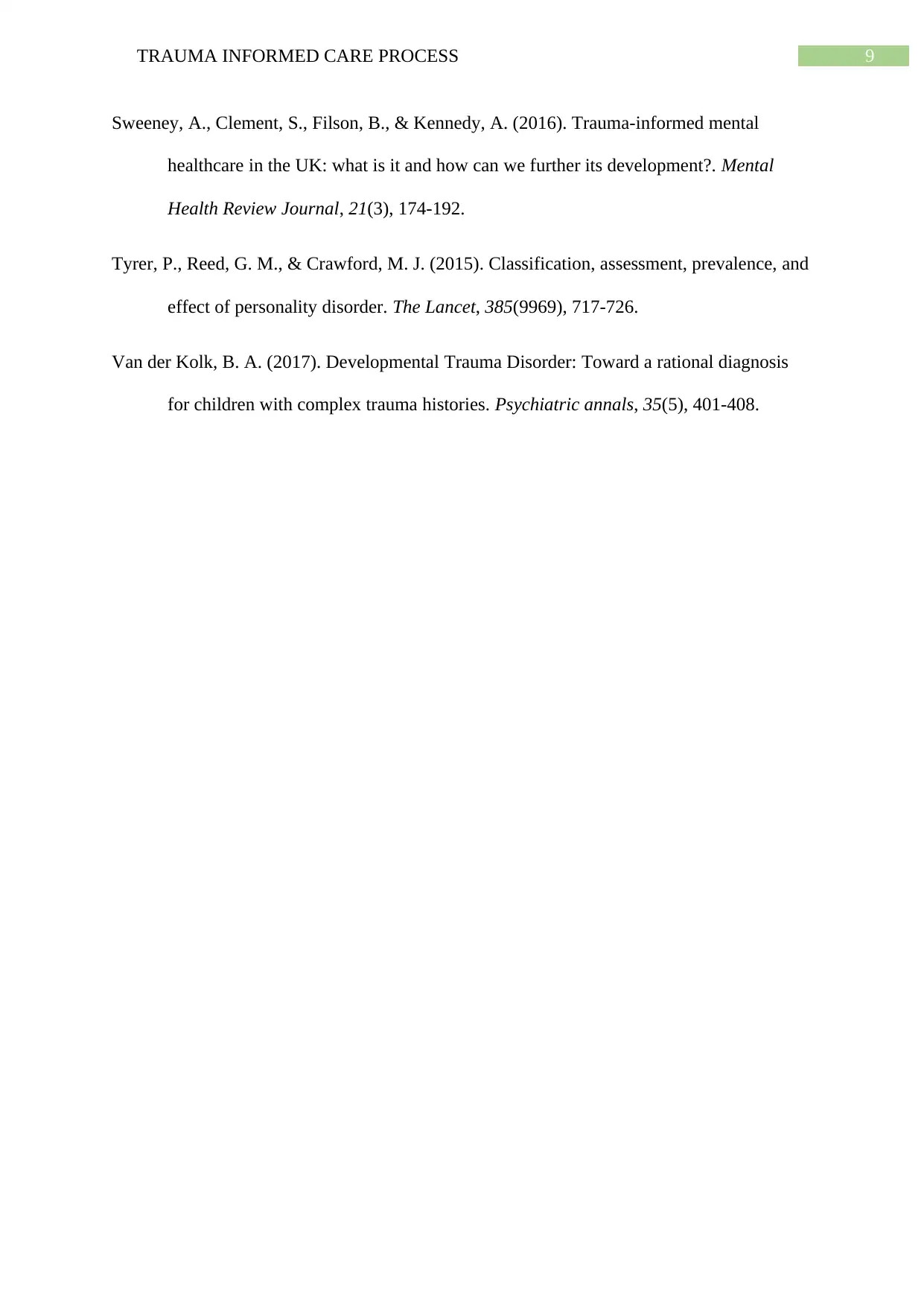
9TRAUMA INFORMED CARE PROCESS
Sweeney, A., Clement, S., Filson, B., & Kennedy, A. (2016). Trauma-informed mental
healthcare in the UK: what is it and how can we further its development?. Mental
Health Review Journal, 21(3), 174-192.
Tyrer, P., Reed, G. M., & Crawford, M. J. (2015). Classification, assessment, prevalence, and
effect of personality disorder. The Lancet, 385(9969), 717-726.
Van der Kolk, B. A. (2017). Developmental Trauma Disorder: Toward a rational diagnosis
for children with complex trauma histories. Psychiatric annals, 35(5), 401-408.
Sweeney, A., Clement, S., Filson, B., & Kennedy, A. (2016). Trauma-informed mental
healthcare in the UK: what is it and how can we further its development?. Mental
Health Review Journal, 21(3), 174-192.
Tyrer, P., Reed, G. M., & Crawford, M. J. (2015). Classification, assessment, prevalence, and
effect of personality disorder. The Lancet, 385(9969), 717-726.
Van der Kolk, B. A. (2017). Developmental Trauma Disorder: Toward a rational diagnosis
for children with complex trauma histories. Psychiatric annals, 35(5), 401-408.
1 out of 10
Related Documents
Your All-in-One AI-Powered Toolkit for Academic Success.
+13062052269
info@desklib.com
Available 24*7 on WhatsApp / Email
![[object Object]](/_next/static/media/star-bottom.7253800d.svg)
Unlock your academic potential
Copyright © 2020–2026 A2Z Services. All Rights Reserved. Developed and managed by ZUCOL.





